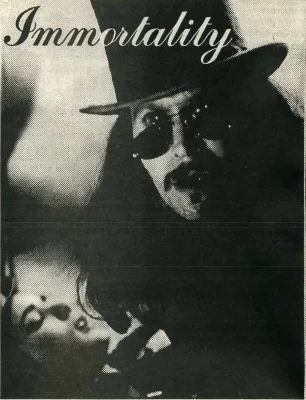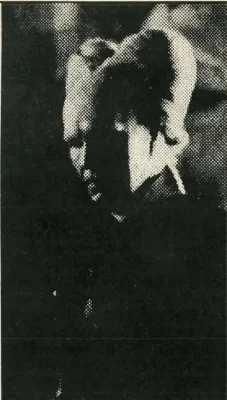The Malady of Immortality: Bram Stoker’s Dracula
Archived

Vampire folklore has ancient origins: the lifeforce of blood leading to tales of those who maintain their immortality by feasting on the blood of others. Documented in the Old Testament, God admonishes his followers to “eat not the blood for the blood is life” (Deut. 12:23). Odysseus visits the Underworld and feeds the dead with blood to give them strength to speak. In the Middle Ages, research has suggested that quite a few people suffered from a deadly blood disease, the symptoms of which included emaciation, tight lips and gums, protruding teeth and a severe sensitivity to the sun. Those who suffered from this malady slept by day and wandered by night, supposedly in search of fresh blood to relieve their pain. Superstitions surrounding bats, wolves and vampires have grown over the centuries, fed by ignorance and religious fervor.
The legends continue into the twentieth century where they fascinate and engage the minds of intelligent and supposedly enlightened people, finding new life and creating new sensations. Societies exist in the present day that claim to hunt vampires. Musicians, authors and filmmakers create art based on vampires. What is it about these creatures that holds so much interest to us? Why have the Dracula films and the latest addition to The Vampire Chronicles been met with so much success?
Could it be that immortality is the key word to unlocking this puzzle? Death has always held a certain amount of stigma, even in our modern society. Death is still a taboo subject, and life after death is either dismissed or drowned in religious red-tape and idealism. You deal with death when confronted by it and avoid it at all other times.
But legend has given us a creature that does not die. Here is a being that will live forever — that has already lived for centuries while watching the progress of the world and experiencing life to its fullest with no fear of death nagging at the back of its mind. This creature also has the power to bestow life eternal, in the same way that religion promises. What could be better? And what could be easier? Forget all the dogma, all the “Thou Shalts” and the “Thou Shalt Nots.” Here is salvation with no strings attached.
According to Bram Stoker’s Dracula screenwriter James V. Hart, “Vampires offer a delectable alternative to the drudgery of mortal life and the promises of religion. They offer immortality here and now — life after death that you can take to the bank, because you can see it in action right before your eyes. You don’t have to take a chance on going to heaven or hell; You can live forever right here on Earth.”
Hart also says, “Vampires seduce us and take us to dark places and awaken us sexually in ways that are taboo. The vampire comes and says, ‘I’m going to kill you and you’re going to love it — and not only that, you’re going to want more.’”
The vampire makes death enticing to human beings. No fear. No regrets. Slight or no pain. Even to be killed by a vampire is an erotic adventure. But to be made a vampire is the ultimate spiritual experience one can have on earth. Vampires are the distorted shadows of angels in general, and the Christ figure specifically. As Christ was resurrected to eternal life, the vampire is also resurrected, but to eternal death.

Filmmaker Francis Ford Coppola says: “Man’s relationship with God is sacramental; it’s expressed through the symbol of blood. So when Dracula rejects God, blood becomes the basis for all kinds of unholy sacraments in the story: baptism, marriage, the Mass…” Blood has always been symbolic of the path to salvation through Christ. “Whoso…Drinketh my blood, hath eternal life; and I will raise him up at the last day” (John 6:54). In vampire lore, blood becomes the literal meaning of immortality, as the drinking of the vampire’s blood makes the body eternal.
Coppola goes on to say that, “Even if people don’t feel a sacramental relationship with God, I think they can understand how many people renounce their blood ties to the creation — to the creative spirit, or whatever it is — and become like living dead. The vampire has lost his soul, and that can happen to anyone.”
The movie and the book are both wonderfully constructed, delving into the psyche of the vampire and making the horror and shock secondary. They do not merely satiate our human blood-lust but study human reactions to the supernatural and the spiritual. Through the responses of the actors in Dracula and the character in Anne Rice’s novel, we can examine our own attitudes toward death and immortality and vicariously see how we might choose if given the opportunity. How many of us would drink the blood of eternal life? How many of us are happy just as we are? These questions are eternal and are raised through the vampire legend, far enough removed that we can make our decision without obligation or pressure to our souls. If the vampire fascinates our own minds, why is that? If the creatures of the night disgust and frighten us, what does that mean? Reaction is meaning.
Dracula also captures the essence of the vampire mystique. It’s full of dark shadows and deep, rich colors which add to the mystery and the sensuality of the vampire. Dracula is, essentially, a love story; it is the love of a man, across time, for a woman; the love of humans for life eternal and the love of the darker side of nature. The Count is a seducer of men and women alike, as he appeals to man’s baser instincts, to the heart and soul. Perfectly opposed, portraying man’s rational side, is Van Helsing (Anthony Hopkins). He is not taken in by The Count or by the promise of immortality, but sees Dracula as a monster, a thief of time and a devil fallen from God’s grace. The war between the mind and the passions is personified in these two men, just as the struggle takes place within the individual. This is the beauty of Coppola’s Dracula, and also its success.
Rice’s influence was felt even by the cast of the Dracula film. In preparing for his role as the fabled Count, Gary Oldman researched his part by reading Rice’s Interview With The Vampire, the first in the series of the Vampire Chronicles. Says Oldman: “Vampires are fascinating. They are selfish, destructive creatures who half despise what they’re doing yet can’t avoid doing it.” This pretty much sums up the character of Lestat throughout The Tale of The Body Thief. He makes choices and doesn’t give a damn about the consequences. He lives only for the moment, no matter what the danger to himself or others may be. This is the excitement of The Tale of The Body Thief — the unpredictability of Lestat.
In much the same way as Dracula, the Vampire Lestat seeks human companionship but is presented with a unique way of achieving this; he is offered a chance for salvation through true death. Rice poses some fascinating and revealing questions about being immortal: What would the vampire do if given the choice of regaining his flesh and blood body? Are immortal creatures dissatisfied with their existences?
Both Lestat and Dracula face their immortality and the question of their relevance in the world of mortals. Both are given the choice between the life of a blood drinker or a natural death. Both make opposite choices. One is comfortable with his “condition,” while the other is not.
And so we come back to the question of immortality. Perhaps in some back recess of our minds, we long for the freedom that the vampire has and for the chance to live forever, free of death. It definitely is enticing and maybe that’s why we love vampires. They will always be with us, taunting us with their promises, a reminder that death is lurking around some dark corner, just waiting.
Check out more from the SLUG Archives:
Movie Reviews: Dracula
Trapped by the Mormons March 20-22 @ The Tower Theater

